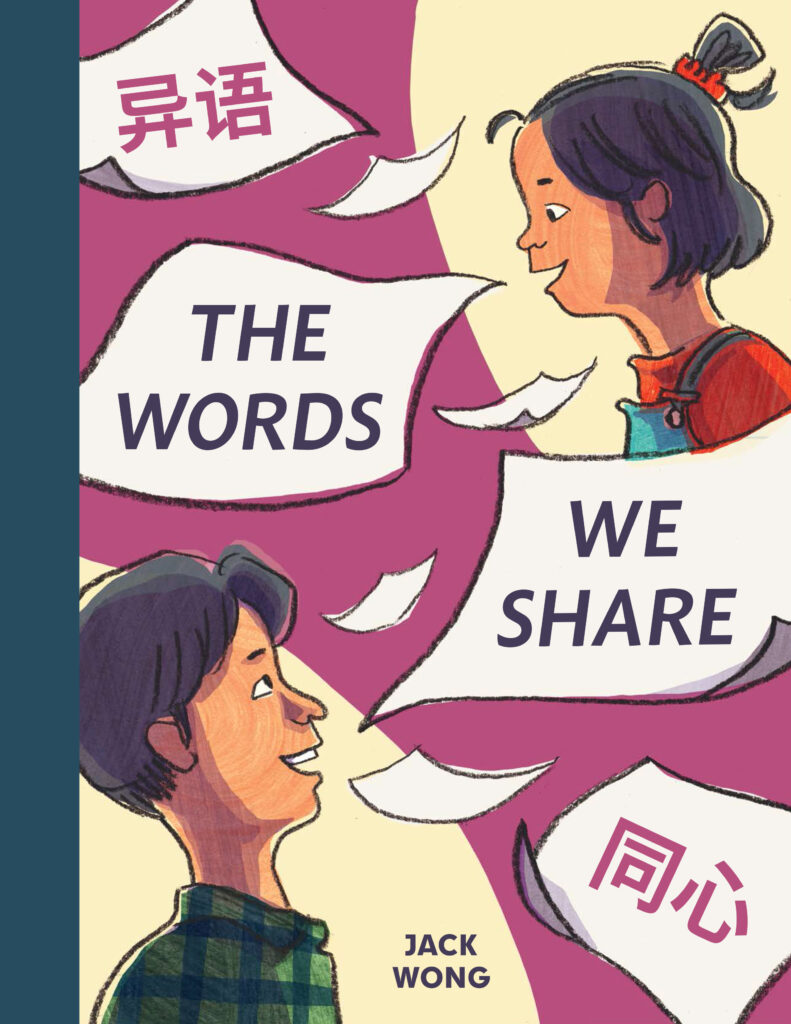
Here’s the book description: “A young girl helps her dad navigate life in a new country where she understands the language more than he does, in an unforgettable story about communication and community.
Angie is used to helping her dad. Ever since they moved to Canada, he relies on her to translate for him from English to Chinese. Angie is happy to help: when they go to restaurants, at the grocery store, and, one day, when her dad needs help writing some signs for his work.
Building off her success with her dad’s signs, Angie offers her translation skills to others in their community. She’s thrilled when her new business takes off, until one of her clients says he’s unhappy with her work. When her dad offers to help, she can’t imagine how he could. Working together, they find a surprising solution, fixing the problem in a way Angie never would have predicted.
A gorgeously illustrated picture book from up-and-coming author-illustrator Jack Wong that is at once a much-needed exploration of the unique pressures children of immigrants often face, a meditation on the dignity of all people regardless of their differences, and a reminder of the power of empathy.”
Andrea: Welcome to Picture Book Builders, Jack! I love THE WORDS WE SHARE so much – as I said in my blurb for your book, “As a daughter who also translated for her parents, this book made me feel seen and cherished as part of a community.” Can you tell us what your inspiration was for this story?
Jack: Hi Andrea! Thank you for having me, and thank you for offering a blurb for THE WORDS WE SHARE. It was a thrill to have you preview the book, and then such an honour to read your words.
Many scenes in this book were inspired by my own childhood experiences: when my family moved from Hong Kong to Canada, both my sister and I (at ages 8 and 6, respectively), picked up English very quickly and translated for our parents in a variety of situations.
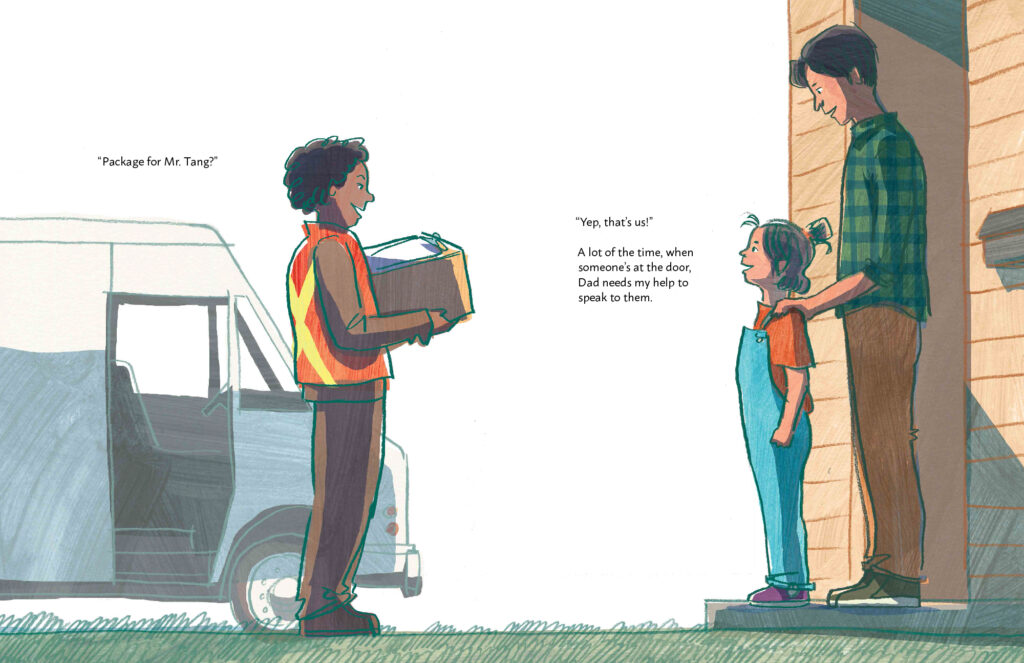
Jack: In your blurb, you mention feeling “seen and cherished as part of a community” by the book… and I have to say that these feelings are shared by another reader: my big sis! Sharing this book with her was like “comparing notes” on our childhood memories; even though the plot is largely fictionalized, I was glad that some of the core emotions — like the way the main character Angie feels at turns proud, frustrated, and even wronged about having big responsibilities at a young age — were true enough to my sister’s experience that she can feel it’s her story, too.
This is all the more special because my sister is now an ESL (English as a Second Language) assessment coordinator at her school board. Through her work, she interacts with children like her younger self, and perhaps a little bit like Angie. She even agreed when my publisher engaged her to write an educator’s guide for the book (lucky me, she’s the perfect person for the job!) In turn, I’m very proud of the position she holds as someone who lived through the experience of coming to a new country, and now stands to create positive experiences for others.
I read in the author’s note for your book, Luli and the Language of Tea, that your parents played this role in their own ways after your family immigrated to the United States. Without ever having met them, I can still say a sincere thanks to them and countless others for having paved the way for those after them, like me.
Andrea: How awesome that your sister is an ESL assessment coordinator and wrote the educator’s guide for you! Yes, both of my parents tried to help immigrants, either by teaching ESL or coaching them to take professional certification exams. They were great role models for me.
The relationship between Angie and her dad is so wonderful. Angie has learned English at school while her father still struggles with the language. In the book, she says, “A lot of things are harder for Dad here in our new country.” She matter-of-factly goes about speaking and translating for her father, to delivery people, in restaurants, and at the store. The book captures another facet of the complicated immigrant experience that we perhaps don’t often see in books – that new and difficult situations can also beget empathy and humor. Was this a deliberate decision? Could you talk a little about your process while writing this book?
Jack: I’m so gratified to hear that you enjoyed the relationship between Angie and her dad. During the lengthy revision process, my (brilliant) editor Katie and I kept coming back to the idea that this story is really about the love between a parent and child, before it’s ever about language, or immigration, or child-entrepreneurial mishaps.
I’m technically what they call a “pantser” when it comes to writing — so the story’s development was never as neat and linear as I’m about to describe it — but it really came down to knowing my main characters first, then putting them into a scenario to see how they would react based on their individual personalities, and how they care for each other. The scenario happens to be moving to a new country and learning a new language, but the book is ultimately not just about those things. This mindset and approach was extremely important, in my mind, to crafting a story that might resonate with all readers, whether or not they’ve personally been touched by the experience of immigration or multilingualism.
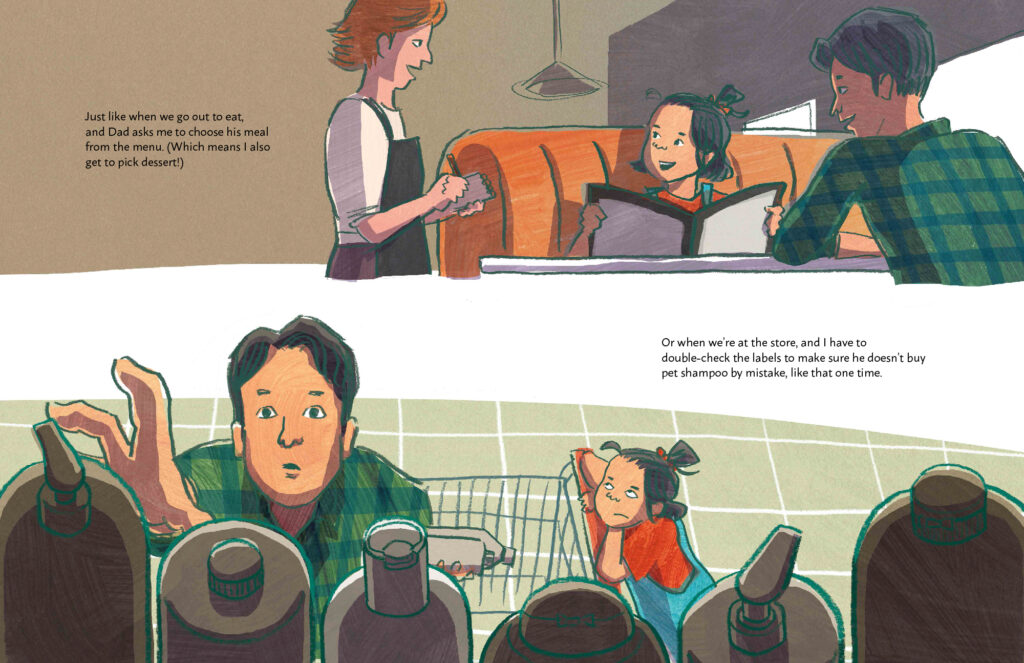
Jack: It’s also gratifying to hear you point out the moments of humour in the story! As a good example of what I mean in the above, I really felt that Angie would feel annoyed at her dad every once in a while — it can’t be happy-go-lucky all the time. My publisher and I were on the same page for the most part, but I had to push for Angie’s eye-roll to be extra when Dad is buying shampoo at the store (I’m glad I did, because multiple readers have said to me, “Yeah, I know that face!” and it’s their favourite illustration in the whole book!)
Andrea: I confess to having rolled my eyes at my parents countless times! I love how you approach writing through “knowing [your] main characters first” and “seeing how they would react.” That’s a great way to incorporate emotional honesty.
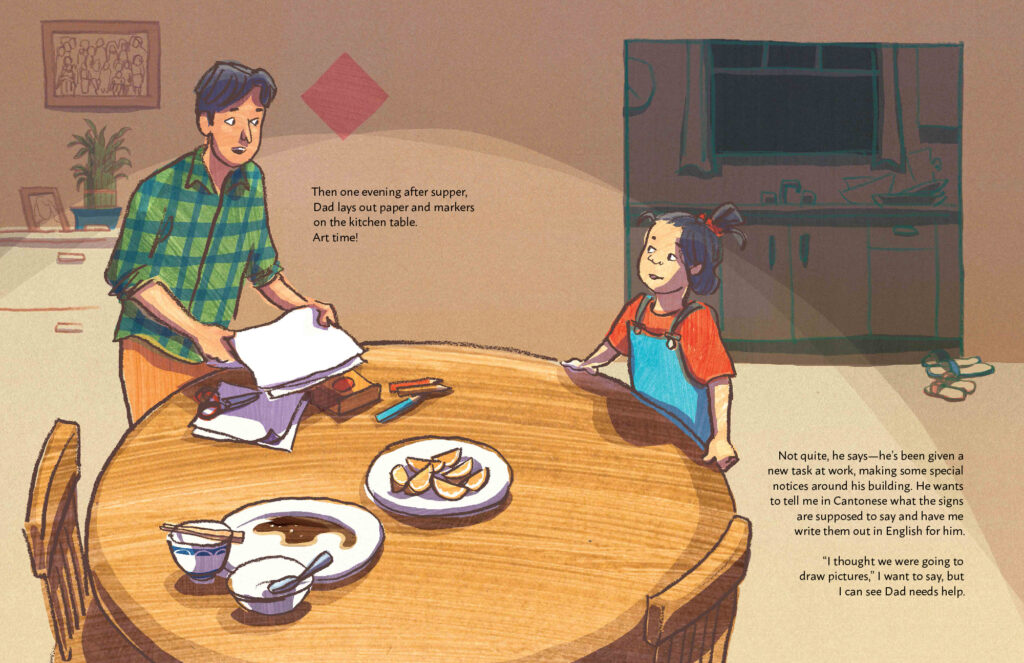
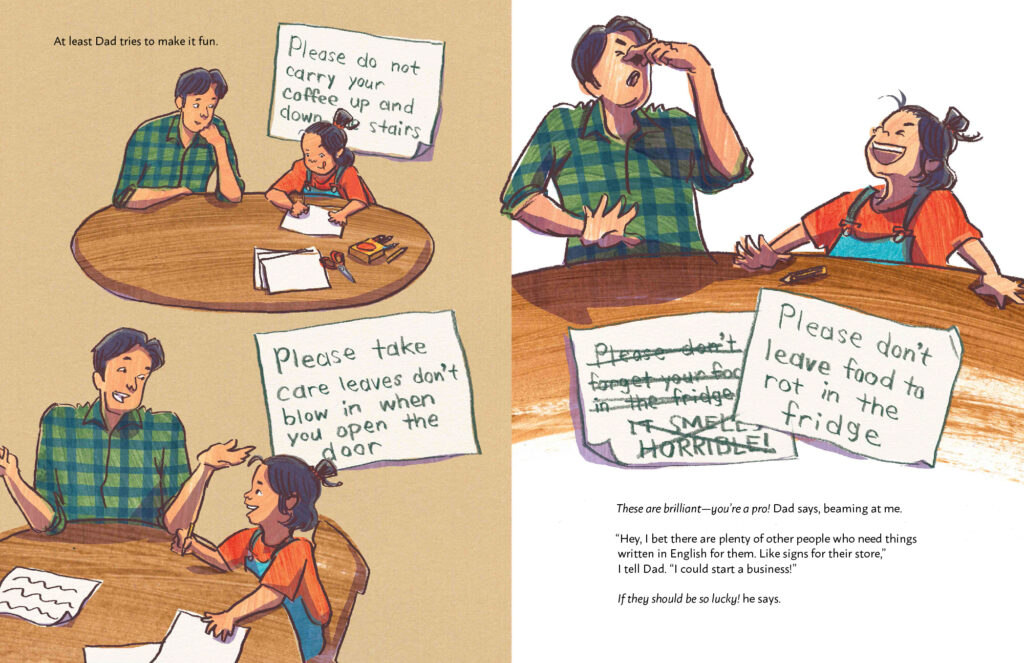
Andrea: There are a lot of layers in the book, both in the text and the art. For the text, you included Chinese characters for the Chinese speakers, with English translations in italics underneath. Sometimes the dad’s dialogue is only shown in italicized English, while Angie’s narrative and dialogue are shown in English. When Angie encounters another language barrier with Mr. Chu, the laundromat owner who speaks a different Chinese dialect than she does, there are no Chinese characters – he communicates “in his English, which is quick and jumpy.” Later, she describes his native speech as “musical sounds.” (I love that, btw!) Could you talk a little about your process of incorporating elements of language? What are you trying to convey to young readers?
Jack: The biggest technical challenge of this story was incorporating the third language/dialect that one of the characters (Mr. Chu) speaks, which sets off the central external conflict. The story would almost benefit from having a voiceover soundtrack, so it’s crystal-clear who’s speaking in what language to whom!… but in lieu of that, it was important for me to be aware that what might make sense to me may not be self-evident to the reader. The best antidote was careful copyediting by fresh eyes (thank you to the many keen people, first critique partners, then the team at Annick Press, who did so!)
Still, it drives home again why I felt the emotional arc of the story was more important than the narrative arc: if the reader can readily understand how Angie and her dad feel at each given point, that helps to bridge an understanding of what’s going on in the plot. For instance, a feeling that comes right at the climax is Angie’s confusion — given this, it’s alright if the reader feels, for the moment, a little confused too, before the specifics settle in. That, after all, is also part of the real experience of immigration and multilingualism!
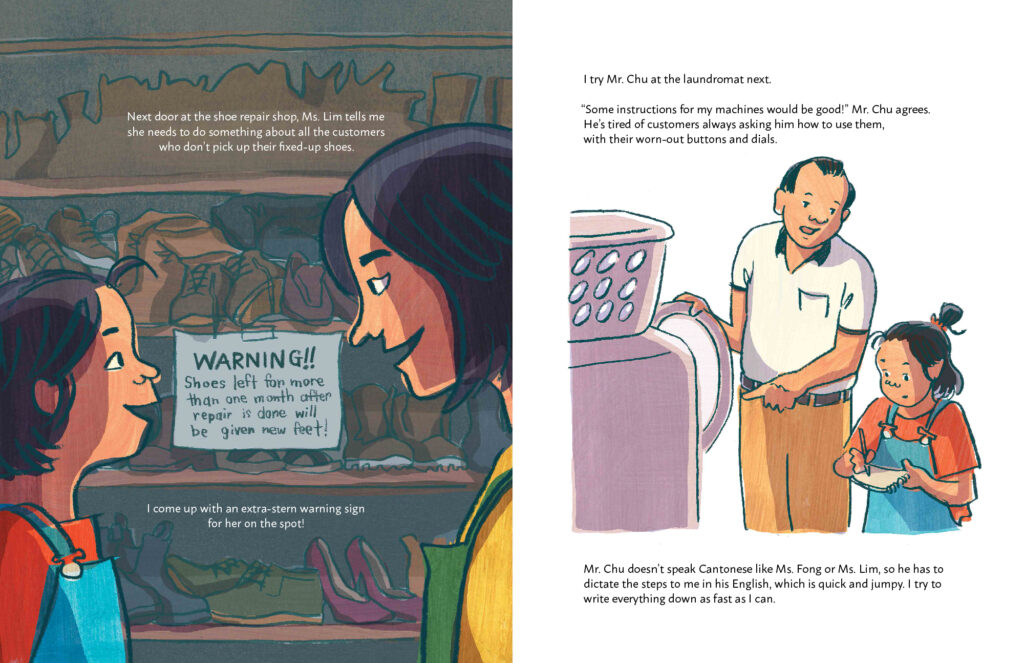
Andrea: A lot of times, I’m trying to be as clear as possible when writing, so it’s a great reminder that sometimes it’s okay if the reader is confused, too, as long as it relates to the story.
Jack: Your question also touched on the other big theme I wish to convey to young readers. Where the book describes Mr. Chu’s accented English as “quick and jumpy”, I was originally going to write “warbled”. However, my eagle-eyed agent Wendi alerted me of an existing Chinese expression, 鸟语 (bird language), which can be used to pejoratively label Chinese dialects other than the speaker’s own; when I thought about it, “warbled” could indeed be read as derogatory, even before associating it with that expression!
Implicit connotations like this were so important to carefully assess throughout — some of them, when they were purposeful, were intentionally kept, because the book is also about those implicit assumptions and judgments we all make. In the course of the story, the reader is challenged to encounter many characters who appear and act differently than they might expect, and hopefully they come to appreciate that there’s always more under the surface. This is the core of Dad’s arc, where we see that someone shouldn’t be written off simply for not having the means to communicate how we’re used to. It’s a universal idea that I hope any reader can take away from the story.
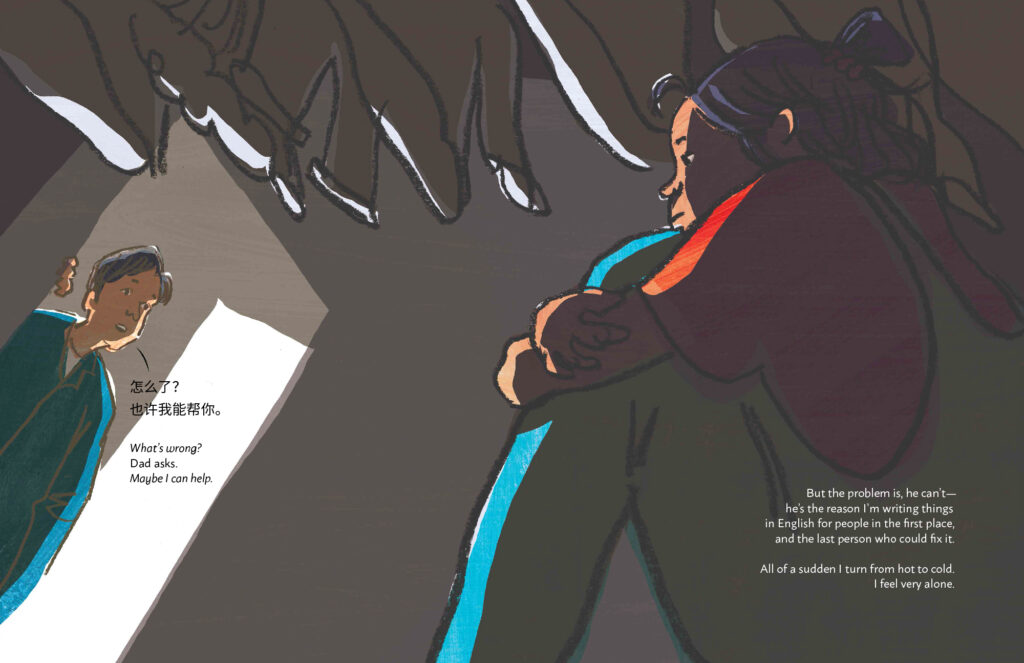
Andrea: You’re not just the author, you’re also the illustrator. The illustrations in THE WORDS WE SHARE are fantastic. Yet they’re very different from your debut picture book, WHEN YOU CAN SWIM, which was published earlier this year and won the 2023 Boston Globe – Horn Book Award (congrats!!). What was your approach to the artwork in this book, and how did you settle on the style and media that you used?
Jack: Thank you for the congratulations! It’s actually really interesting to compare notes with an author of multiple published books. You’ll have had the experience of your publisher painstakingly matching a different illustrator with each of your stories, given its subject and tone — as an author-illustrator, I’m actually stuck with just myself!
Because WHEN YOU CAN SWIM and the current book have such different styles of writing, it was never a given that I should illustrate them the same way. Still, as a solo act, it’s hard enough to have one art style up your sleeve — I definitely didn’t have a second one. So the artwork in THE WORDS WE SHARE was the result of experimenting to find a whole new style for the story. That might explain the blend of traditional and digital media, which emerged from a kitchen-sink approach — I just kept throwing things at the wall until something stuck! The final art was created by first making swatches of texture and colour (with acrylic paint or with printmaking ink rolled on paper), and separately, line drawings in pencil or crayon, which were then all scanned and digitally collaged in Photoshop.
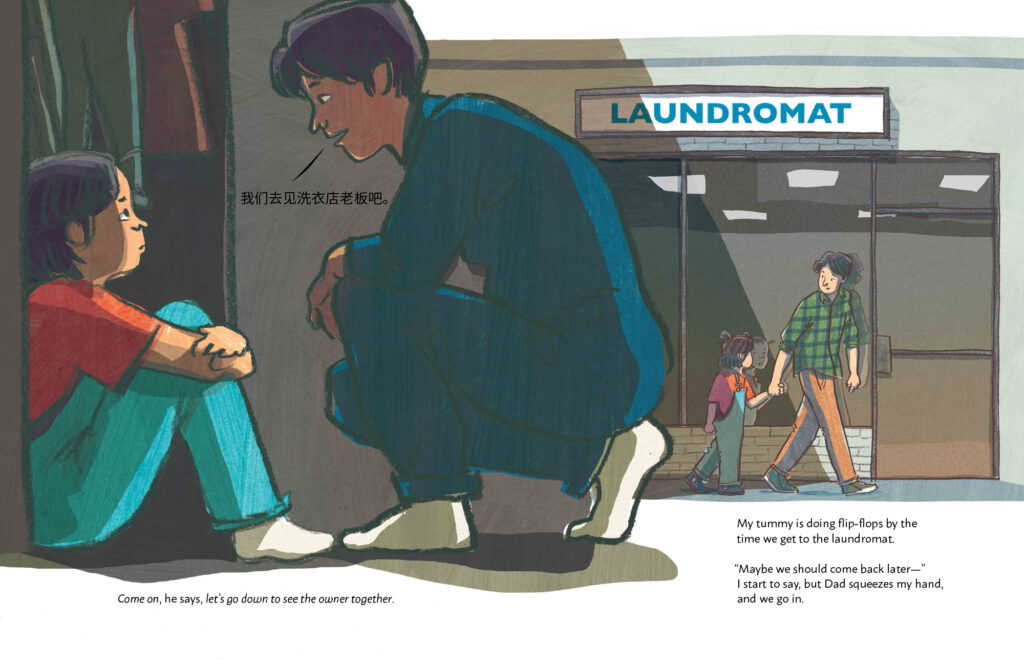
Jack: I should note, with much admiration, that the process I just described happens even when you’ve hunted down the perfect illustrator for the job — at the best of times, the illustrator is still responding to the text and being pushed to new places. I loved reading the artist’s note for Watercress, where your collaborator Jason Chin describes how he brought influences of Chinese brush painting into his existing watercolour approach — but even more interesting is how he started off exploring in pastels! That must’ve been exciting to see develop.
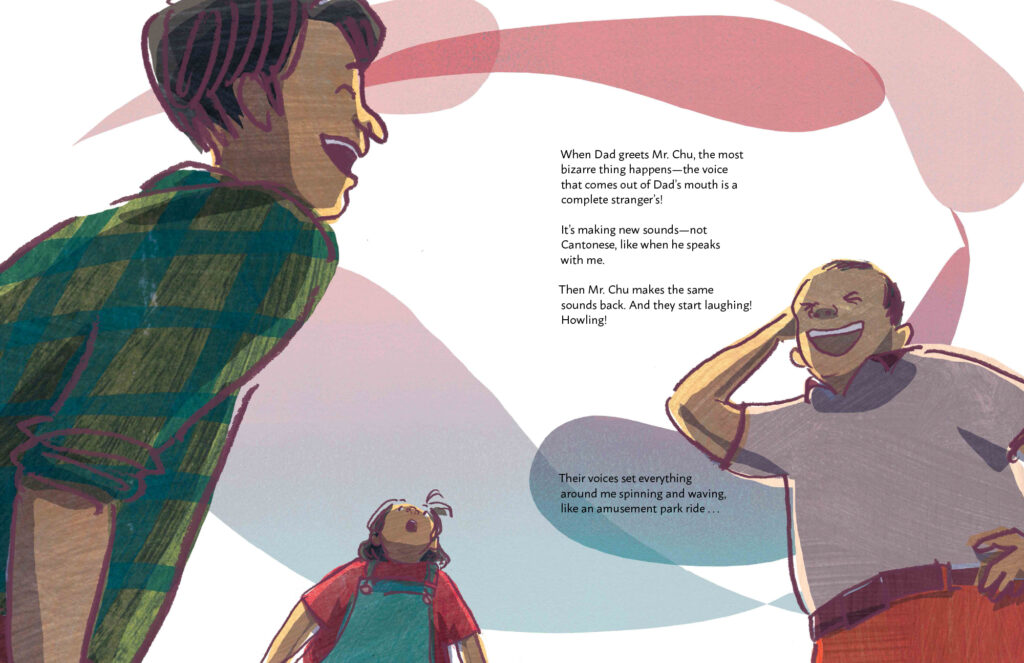
Andrea: I’ve been incredibly fortunate to have had amazing illustrators for all of my books! I didn’t see a lot of Jason’s early sketches – just hints on his Instagram account. It’s interesting to think about how different a book Watercress would be if he had stuck with pastels or brush and ink. In your case, I think the kitchen-sink approach worked out great!
In your author’s note, you explain how the Chinese version of the title translates to something like, “The Same Heart in Different Languages.” I honestly teared up a little reading that; it resonated so deeply with me. Could you tell our readers why you chose a title that is different from the English title, and what it means to you?
Jack: I will have to tell my mother this — she was the one who created the Chinese title!
I only have a conversational level of Chinese, which meant I needed the expert help of my mom and other good friends for the translations in the book. As someone who’s lived with both English and Chinese, I did have the implicit and subconscious expectation that the title couldn’t be translated directly… I suspect it comes from (often painful) experience, communicating with my family for example, that the more abstract ideas are typically not really translatable. Perhaps the final result resonated with you because some of this is baked right into the words “The Same Heart in Different Languages”! The title certainly means a lot of unexpressible, intangible things to me, too.
The task that I gave to my mom was to come up with a four-character title — this is the standard form of Chinese idioms called 成语 (“chéngyŭ” in Mandarin, “sing yu” in Cantonese). Like idioms in English, most 成语 are of historical origins, but it’s also common practice to imitate their conventions, such as a symmetrical pairing of ideas (the first two of four characters typically form one idea, the latter two form its counterpart) and grammatical brevity (e.g. doing away with prepositions and conjunctions) to get to this really density compacted, poetic nugget. So I essentially handed her the Herculean assignment of inventing the perfect idiom to capture the story — and she delivered! To do so, she had to reflect on the story as a whole, not just the English title, which is why it’s almost more of an alternate title than a translation.
Andrea: OK, coming up with an original chéngyŭ sounds nerve wracking. Kudos to your mom! And kudos to you on another amazing book! I’ve really enjoyed learning more about your process and THE WORDS WE SHARE. What’s next for you – do you have more projects in the pipeline?
Jack: My next book, ALL THAT GROWS (Groundwood Books) recently went to press, and comes out in March 2024! I’m also working on illustrating a PB bio about Yo-Yo Ma (Abrams Books for Young Readers), written by the wonderful James Howe — it’s an honour to be gleaning so much wisdom from both the author and the subject of this project. Finally, I’m working on a second book for Scholastic, who published my debut WHEN YOU CAN SWIM. It’s still in its early stages, but is shaping up to again touch upon the immigrant experience, this time through a microcosmic look at one animal.
But before I really get to all that, I’m having so much fun promoting THE WORDS WE SHARE! Though I now live on the east coast of Canada, I was raised in an area of Vancouver with a particularly large immigrant presence, so I felt it would be meaningful to return home to launch the book with events there (but really, it’s all an excuse to be the star visitor at my nieces’ school).
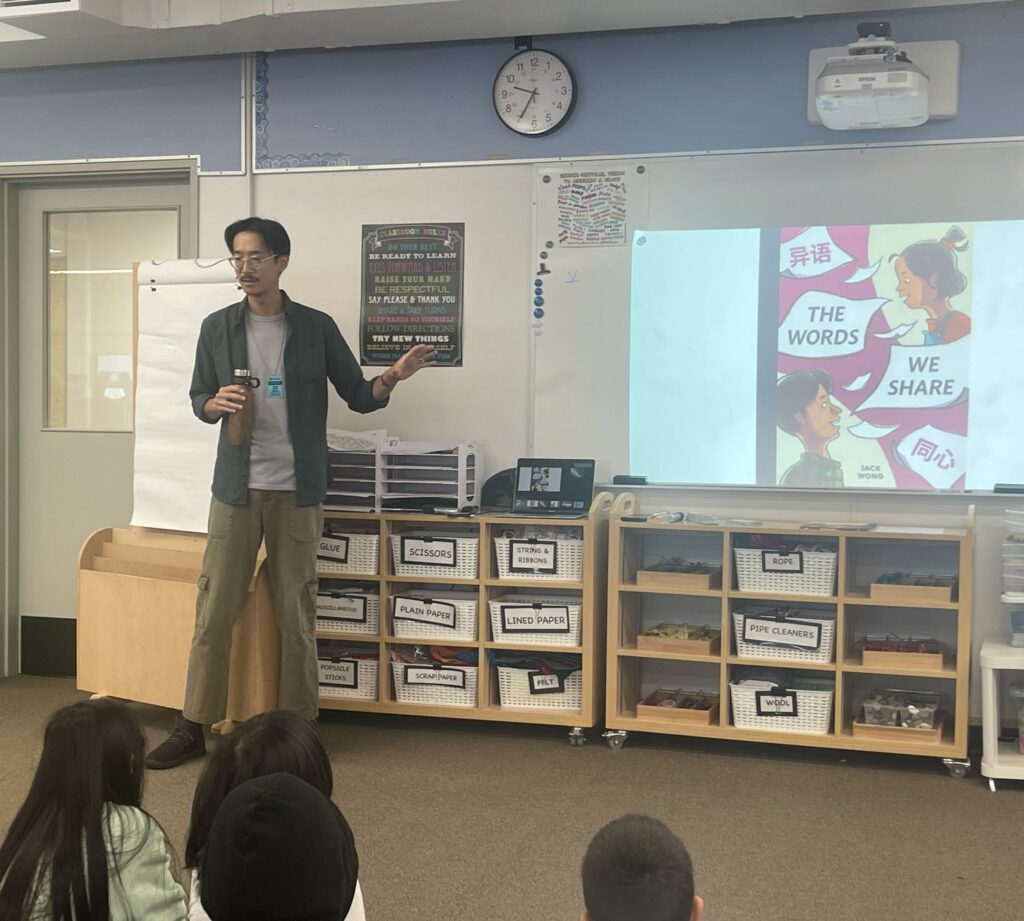
Jack: In the US, the book comes out on October 10th, so a pre-order campaign is still on, with perks including a raffle for an original piece of art by yours truly — please check it out via my social media (Jacquillo_ on Instagram or Twitter)!
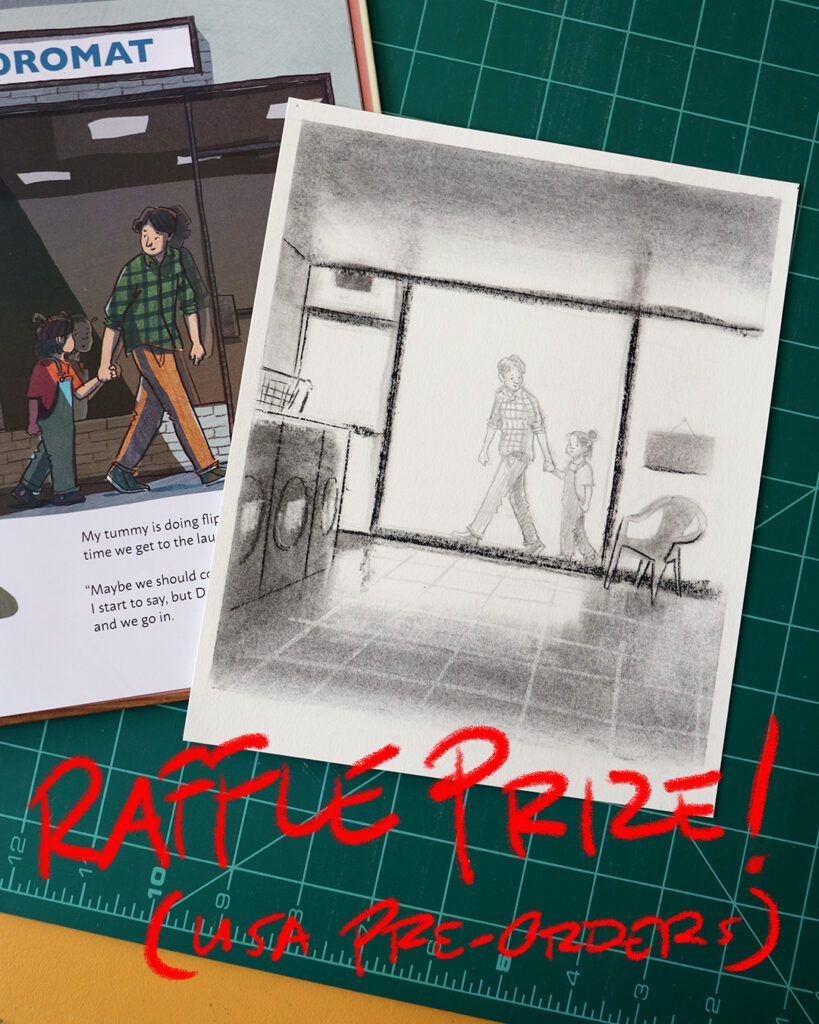
Andrea: Wow, all of this sounds great. Plus an amazing pre-order prize! Jack, thank you so much for this wonderful conversation! PBB readers, don’t forget to pre-order from either Bookmarks or Linden Tree Books before October 9th to enter the raffle for Jack’s original art! Jack is also giving away a copy of THE WORDS WE SHARE to a reader — comment below by Tuesday, October 17th, to enter. This giveaway is open to both U.S. and Canadian readers. For more about Jack and his work, go to https://jackwong.ca/.

JACK WONG is based in Kjipuktuk/Halifax, Nova Scotia. Born in Hong Kong and raised in Vancouver, Jack creates stories indelibly marked by a first-generation Asian Canadian experience. His first book, When You Can Swim, won the 2023 Boston Globe–Horn Book Picture Book Award.

I love all of this, especially everything about how his mother created the Chinese version of the title!
Rest assured I’m passing on each and every comment about the title to my mom 😀 Thank you, Rebecca!
So many layers to this story – such an interesting interview! Jack I am looking forward to reading THE WORDS WE SHARE and your upcoming titles too!
Thank you, Cathy — it was fun to be able to share all those layers!
So many students in my school will be able to relate to this book. Many of them must translate English into Spanish for their parents. I will be purchasing this book for our library. Thank you for sharing you r story with us.
Thank you, Heather — I’m so touched by what you shared, and hope I’ve done some justice echoing your students’ (varied and diverse) experiences!
Thank you for the excellent interview! This book is a must read for me. I love the father and daughter loving relationship. We have many immigrants from Asia living in my home town and learning more about what it feels like not to be a native speaker is very important to me.
Thank you for your interest, Danielle!
What a wonderful interview, Andrea. Hearty congrats, Jack, on such a moving and beautiful book!
Thank you, Maria! And it really was a wonderful privilege to chat with Andrea about it 🙂
I can relate to this as I am an immigrant myself and those who can write about it are appreciated and celebrated. We need our voices heard. I am proud to be an immigrant. Thanks to all immigrant authors who keep giving us these wonderful stories through books. More power to you all!
What an affirmation and gift to me and all immigrant authors, Alicia — I will keep your words close!
This book sounds fascinating. Thanks for sharing this interview.
Thanks for your interest, Kathy!
Andrea and Jack, thank you for a lovely interview. Jack, you are so generous to share so much with us. I loved reading about your process, how character-driven the story is, and how layered. My favorite type of PB. I know so many kids who translate for their parents or grandparents. They will enjoy your beautiful story! Congratulations!!!
Thank you, Vijaya — it was my pleasure to reflect upon my my own work, knowing there will be thoughtful readers like you on the other other end willing to engage with my wordsoup 😀 I do hope those kids will enjoy the book!
Such a great topic. I can’t wait to read it.
Thank you Loreli, I hope you enjoy it!
What a wonderful and important book for children! This situation is one that so many children will recognize and identify with. Congratulations, Jack!
Thank you, Patricia!
Wow, hard to believe that an experience as common as this is finally beginning to really be explored. It’s been a long time coming. So wonderful. I can’t wait to read this book.
I thought so, too! Thank you Sue, and I hope you enjoy reading it.
Jack, I could have used your book when I was teaching English as a second language. Thanks for writing such an important book for so many kids.
It’s been a privilege, through making this book, to connect with educators and especially ESL teachers for whom this story hits close to home. Thank you for sharing, Kathy!
Great interview! Love how you used your childhood experience for this & involved your sister & mother! Ooo, All That Grows looks really beautiful too! Congrats, Jack!
It didn’t start out as a family affair, but by the end it really felt like it was destined to be this way! Thanks, Tina!
I helped a neighbor, a newly arrived woman and her three young boys from Taiwan, to learn English using a driver’s manual as she wanted to get a driver’s license. Her sons learned English quickly from children on the playground, but it took Mei much longer; however, she did eventually learn enough English to get that driver’s license!
Another aspect within that story is that kids get to learn a new language through fun and low-stakes interactions, while adults have to learn it through boring and stressful jargon (immigration documents are another thing)! Mei was fortunate to have your help, Judith. Thanks for sharing!
Congrats, Jack! I’d love to win a copy to share in my Little Free Library.
Thank you Susan — I should stay unbiased, but I’d love to see that!